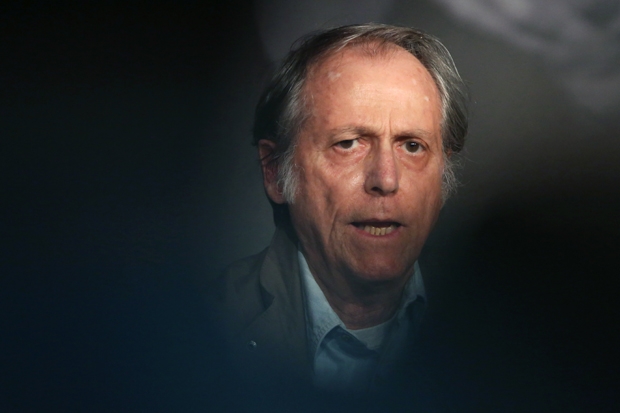Cults, the desert, natural disasters. Artists, bankers, terrorists. Cash machines, food packaging, secret installations. Mediaspeak and scientific jargon. Crowds and capital. Language and death. Just as it used to be possible to play Ballard Bingo with the work of the late 20th century’s other great literary monomaniac, so Don DeLillo’s themes have remained astonishingly consistent in the 45 years since Americana, his first novel, appeared. The unswerving focus has a lot to do with why, like Ballard, he has so often been charged with prophecy: in cryptic gallows comedies such as White Noise and The Names, with their sinister wonder-drugs and murderous language cults, or the spacey and frigid Mao II, with its ‘new tragic narrative’ of ‘midair explosions and crumbled buildings’, he seemed to be telling us stories about the confused 21st century long before it arrived.
But the frigid prose of Zero K, his 16th novel, is so clotted with familiar themes that it sometimes resembles a sedulous parody of the author by himself. It’s set in an underground facility (check) called The Convergence, in a remote desert (check), where Jeffrey Lockhart, a ‘cross-stream pricing consultant’ and ‘implementation analyst’ (check) is summoned by his father Ross, a banker (check). The Convergence has a notably cultish feel about it (check — I’ll stop scoring now). It is a cryonics facility that aims to ‘rewrite the sad grim grieving playscript of death’, freezing and preserving its clients until science can rebuild their bodies.
This isn’t science fiction, or at least it’s becoming less so. The real-world futurologist Ray Kurzweil, an adviser to Google’s anti-ageing laboratory Calico, has been speaking for years about ‘Bridge Three’, when nanotechnology, working at a molecular level, may allow us to restore cells and turn back the damage of age. And that is the fate that the novel’s tycoon Ross Lockhart has laid on for his terminally ill wife Artis, who, shortly before being euthanised and frozen, declares her plan to ‘enter another dimension. And then return. For ever more.’
Lost in the warren of the Convergence, with its peculiar Andromeda Strain vibe, Jeffrey muses in forbidding and familiar DeLillo-like cadences on life and death. The facility is a strange hybrid of art and technology — I’m tempted to start scoring again — that is studded with posed mannequins and half-glimpsed human shapes; around every corner lurk screens where films of natural disasters and human cataclysms are projected. He listens in on the establishment’s other residents, to whom he gives made-up names, and cogitates for long periods on the relationship between the word and the object. ‘I was beginning to understand that every act I engaged in had to be articulated at some level, had to be performed with the words intact.’
In fact Jeffrey mainly exists to perform another function altogether: that of signposting the author’s metaphors in case we miss them. ‘Could I avoid interpreting the figures as an ancestral version of the upright men and women in their cryonic capsules?’ he wonders, lest the reader has snoozed on the job amid all these images of bodies and echoes of religious iconography. ‘Is this the desert where miracles happen? Are we here to repeat the ancient pieties and superstitions?’ Back in New York, he is called to turn his flat gaze on a bunch of other familiar DeLillan situations — the cash machine, the crosstown car ride, the film of a faraway war — offering glosses in blandly explanatory tones. ‘When we returned from the Convergence, I announced to Ross that we were back in history now.’
Readers of DeLillo’s work will be familiar with this chilly dialectical tone, but perhaps less so with the strange, self-swallowing presentation. In this novel about the solipsism of defying death, DeLillo has written his most solipsistic novel yet: one that ends up with less to say about events in the world than about what it’s like to exist in the icy, trope-crammed, once-predictive zone of this novelist’s mind. ‘We are pledged to an inwardness, a deep probing focus on who and where we are,’ says one of the Convergence’s evangelising founders. ‘You are about to become, each of you, a single life in touch only with yourself.’ But DeLillo, it seems, is there already.






Comments